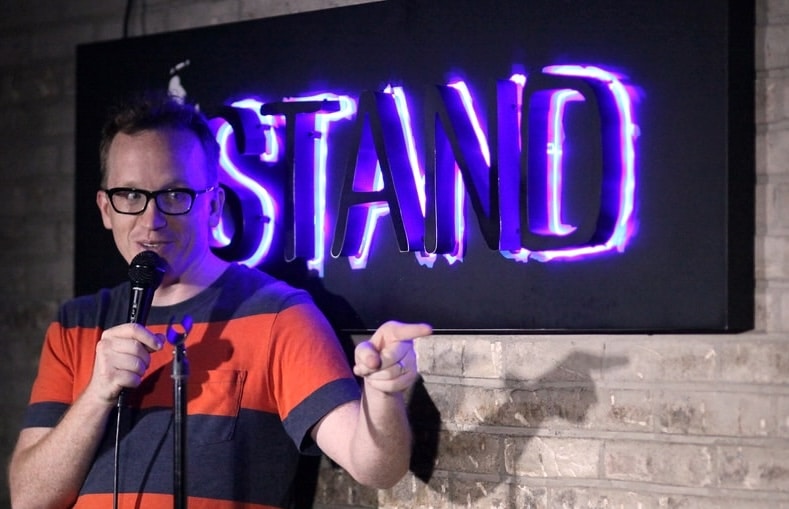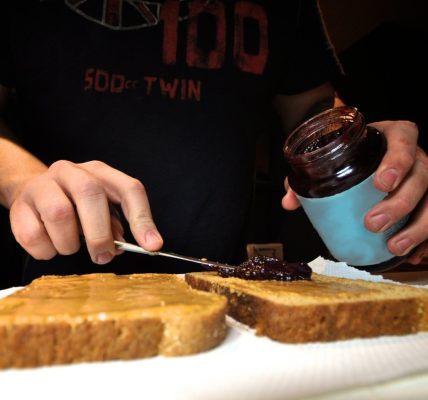Chris Gethard and the Long Haul

In a nightclub, where a lot of booze has to be sold just to keep the doors open, a comedian is often up against a negative and unhealthy audience expectation. The crowd usually includes some jerks who would love to see the person on stage get outta-control drunk and make a ridiculous spectacle of himself or, better yet, herself. Sometimes, those ill-intentioned folks even include fellow comedians. It might be the most difficult profession in which to maintain sobriety.
Chris Gethard, now well over 40 years old, had spent the first part of his adolescence as a blackout drunk who didn’t even get any fun out of it. Then he discovered improvisation and joined UCB (Upright Citizens Brigade Theatre) and surprisingly found himself inclined to refrain from drinking before going on stage.
This is exactly opposite from the pattern of many show business addicts, who feel the need to “loosen up” with a substance before hitting the stage. On the contrary, he has said that performance was the only thing that made him feel not just normal, but even positive about himself. Those other times, when he felt shy and low in self-esteem, were the drinking times.
Masses of wildly creative onstage frolics with a group of other maniacs really helped. Improv was a cooperative, not competitive, situation, and at 21 Gethard quit booze. He has accumulated a shining record of sobriety for well over 20 years now… except for that forthrightly admitted music festival relapse in 2012. It wasn’t booze that time, but a huge amount of MDMA all day long. About that, he is quoted as saying “I go overboard with things” and “It wasn’t cool.”
People who “go overboard” with substances are famous for the ability to whip up a rationale at a moment’s notice; one that satisfies themselves at least, if not others. Gethard later explained to a journalist his reasoning at the time: “I’m probably not going to be in this situation too many more times in my life, plus I know I have willpower.”
The self-trust turns out to have been justified, because he has earned a list of IMDB (Internet Movie Database) credits longer than most people’s arms, and in not just one but several entertainment categories, including writer, producer, actor, director, and more. He has also authored six published books.
In the summer of the slip year, he was at the notorious Edinburgh Festival Fringe to debut Career Suicide, which deals with depression, suicide attempts and alcoholism. In 2017 this one-man show hit the Broadway stage, prompting an interview about it conducted by National Pubic Radio’s Terry Gross and then another with David Bianculli. One subject was an occasion when Gethard almost gave in to the impulse to get in a deadly wreck:
I don’t really understand how it’s cowardly to kill yourself. I don’t get it. Suicide — when I think of it, to me it means someone had a lot of problems and they couldn’t fight through them anymore. That’s not cowardly. It’s sad and nothing but.
He also discussed the marvelous healing power of improvisational theater:
When it works, it’s just magic. It feels like you’re a part of a greater whole. As a person who never really felt like I fit in in a community, to find an art form that’s based around linking up with a handful of other people and creating something that has to be communal, it was so exciting and addictive and eye-opening.
One thing that fellow comics do for each other is point out which aspects of their conversations deserve to be sculpted into bits for the live act. When Gethard went on the road doing club shows with Mike Birbiglia, another guy with plenty of issues, he confessed the temptation to self-obliterate:
I thought he was going to be really sad, and he goes, dude, that’s hilarious. You have to tell that on stage…
Gethard took this as a challenge which, in all manliness, he could not ignore. He figured the audience would be turned off, and he could go back to Birbiglia and point out how stupid the idea was and say “I told you so.” Instead, the opposite happened, and New York audiences greeted his morbid material with warm enthusiasm:
Almost immediately, people started waiting for me after shows… And they’d tell me that they identified with [the stories] or knew people in their family who dealt with that stuff.
It is commonly known that many performers believe sobering up will cause them to stop being funny, and in the same vein Gethard believed that if he took anti-depressants on top of being sober, his creativity would dry up. But as the NPR interview revealed, the opposite happened:
It really helps. Like, the whole romanticized sad clown thing — we got to get rid of that… That’s just getting sick people to voluntarily stay sicker and sadder than they have to be.
In addition to freedom from alcohol, Gethard found it very liberating to not be ruled by the mania, which he found more dangerous than depression. Ideas that had seemed so brilliant one day would suddenly show their true colors: not so good:
And you’ve invariably made some decisions you’re not proud of and have some rebuilding to do. So, for me, the manic side is much scarier because it can be really fun. People like being around it, but that doesn’t mean it’s healthy.
On medication, the artist could be organized, do second drafts, resist destructive impulses, let creativity flower, and even “get out of bed consistently” which, for any kind of professional life, is a pretty basic requirement.
Written by Pat Hartman. First published February 7, 2025.
Sources:
“Oprah Through the Years, Part 11 — Concepts of Will,” Childhood Obesity News, January 21, 2025.
“Chris Gethard,” IMBD, undated.
“Chris Gethard — Career Suicide,” YouTube, undated.
“Manic And Depressed, ‘I Didn’t Like Who I Was,’ Says Comic Chris Gethard,” NPR, January 6, 2017.
Image Copyright: Lisa Gansky/Attribution-ShareAlike 2.0 Generic




